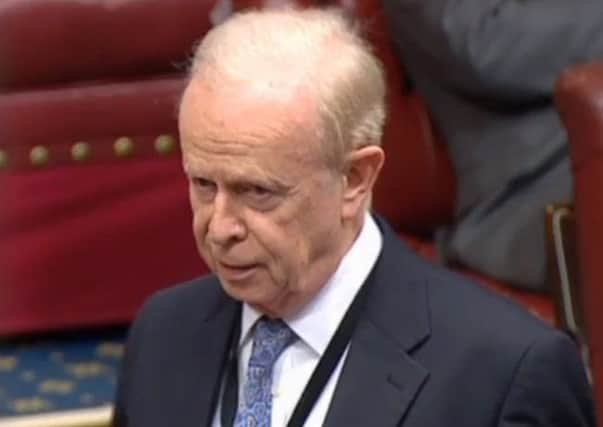RHI: Despite revolt by peers, bill meaning massive subsidy cuts clears Lords


The outcome of today’s proceedings in the House of Lords means that the cuts are now almost certain to become law, with legal proceedings by boiler owners to immediately begin once that happens.
The Lords proved more effective at scrutinising the RHI legislation than the Commons, which had unanimously voted the bill through without any substantive changes from Secretary of State Karen Bradley.
Advertisement
Hide AdAdvertisement
Hide AdWhere Ms Bradley defended how she had handled the process – and her decision to tag the RHI legislation on to a bill about rates in Northern Ireland – the NIO’s minister in the Lords, Lord Duncan, struck a very different tone.
Lord Duncan admitted that it had been wrong to do what the NIO had done in combining the bill. In a further admission that the NIO’s entire approach to governing Northern Ireland is amiss, he said that the levels of scrutiny of governance in Northern Ireland are “inadequate” and he will consider how that can be addressed.
Lord Duncan admitted there was inadequate scrutiny and “it is not acceptable that this house is treated like a rubber ball to be bounced gently into some sort of decision”.
He admitted that the rates and RHI legislation “do not fit comfortably together” and that putting them in one bill had been “a mistake” which would not be repeated.
Advertisement
Hide AdAdvertisement
Hide AdThe bill will see the earning potential of a typical boiler fall by 96% from the rates which Arlene Foster personally guaranteed would never be altered. Many boiler owners, who had already seen big cuts to their payments two years ago, have said that the changes will put them in financial hardship or threaten their businesses.
Lord Empey brought two amendments which would have ensured proper scrutiny of the proposals before they became law by delaying any changes until after a Commons committee had examined them.
The former Stormont energy minister said: “The scheme is so complex that I do not believe parliament...has had any chance to assess it. That’s fact.”
Lord Empey’s amendments received support from around the chamber - from Tory, Labour, Liberal Democrat, Ulster Unionist and Crossbench peers. The UUP peer said that there were more peers in the chamber than he had seen on an Northern Ireland issue “for years”.
Advertisement
Hide AdAdvertisement
Hide AdLord Empey put it to the minister that not just the cost of the boilers should be taken into account, but also the borrowings that they undertook for further activities on the strength of the government guarantee “is also taken into account”. That, he said, was the “key issue”.
Lord Duncan gave that undertaking, saying that “financial hardship must be understood in all its manifest forms...so the answer is yes.”
Lord Empey said that DUP chairman Lord Morrow had said at a briefing with officials that there was a “moral issue” about payments which Stormont had promised to individuals. He said there was a need for justice for both claimants and taxpayers.
But DUP peer Lord Hay said he wondered “is this all about having a go at the Democratic Unionist Party, or maybe there’s a local government election” soon. Speaking in favour of the proposal, he said that a more generous scheme would be “illegal” under EU state aid law, so “it’s either this scheme or no scheme”.
Advertisement
Hide AdAdvertisement
Hide AdFellow DUP peer Lord McCrea said that he wanted to remind the Lords that the Stormont Executive and the Assembly committee which scrutinised Arlene Foster’s department had unanimously passed the scheme.
Conservative peer Lord Mackay said there was an important principle that when a member of the public accepted a government guarantee they should be able to trust that guarantee
Rising after Lord Mackay, Lord Trimble said: “I think we’ve just heard a contribution which settles the issue.”
Lord Trimble said it was “heartening to see the revolt” by the Lords in refusing to accept the NIO’s attempts to ram the legislation through with minimal scrutiny.
Advertisement
Hide AdAdvertisement
Hide AdTory peer Lord Cormack said that the outcome of the scheme had been “catastrophic”.
He added: “We are dealing with citizens of the UK who have, maybe inadvertently - although I’m not entirely sure about that - misled; who have made financial decisions, who have in come cases in good faith, borrowed and been lent very large sums of money - and who now find their very livelihood on the brink of collapse.”
UUP peer Lord Rogan said it was “noteworthy that DUP MPs did not oppose the bill by voting against it when it came to the Commons”, despite their leader’s role in setting up RHI.
Lord Maginnis said: “I do not believe there can be any moral justification whatsoever in leaving Northern Ireland farmers to carry the can for that error” by Stormont and said that the Northern Ireland Civil Service was dumping the pain of their failure on claimants.
Advertisement
Hide AdAdvertisement
Hide AdLord Duncan said that in a late concession because of the strength of peers’ feelings, Stormont’s Department for the Economy would set up a unit under independent chairmanship to examine every case of those in receipt of funds who believe they have experienced hardship “to understand their situation”.
However, despite widespread support for his amendments from all sides of the house, Lord Empey did not put them to a vote.
The NIO argued that if the law was not passed by peers then all payments would stop at the end of this month. But Andrew Trimble, chief executive of the Renewable Heat Association which represents most boiler owners and which had lobbied peers, said that it did not accept the argument that all payments would have ceased. He added: “We would far rather no law had been passed than bad law.”